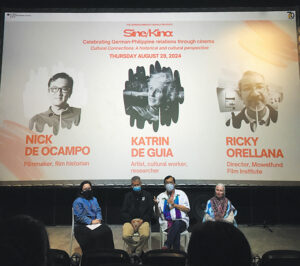THE FILM industry in the Philippines is hoping to revive its cultural exchanges with Germany, which have influenced Filipino alternative cinema and film studies over the years. This according to filmmakers and researchers at an Aug. 29 forum organized by the German Embassy at Sine Pop, Quezon City.
“My personal history with Germany started at the Berlin Film Festival in 1982, when I met my producer Hagmut Brockmann, who supplied Super8 films for me to make Oliver,” said Nick Deocampo, a filmmaker and film historian, at the event.
He then cited the films of Raymond Red, also present at the talk, as products of workshops that occurred under the Mowelfund Film Institute (MFI), a hub for filmmakers to learn and practice their art in the 1980s with the help of many German partners.
These included mentors like filmmakers Ingo Petzke and Christoph Janetzko and then-Goethe Institut director, Uwe Schmelter. They had worked closely with Mr. Deocampo when he was the director of MFI and put up film screenings, lectures, and workshops.
“We really blossomed as a film movement in the ’80s, coming from the People Power Revolution and thinking deeply about social change. We related with German abstract and experimental filmmakers, who showed us the medium’s potential to be a revolutionary cinema,” he explained.
Ricky Orellana, the current director of MFI, agreed that the partnerships were essential to establishing “a very strong alternative movement in the Philippines,” now called independent or indie.
It was in 1985 that Mr. Orellana got involved in the alternative scene, when he started enrolling in filmmaking workshops conducted by Mr. Petzke and Mr. Janetzko. His batchmates included Lav Diaz, Larry Mando, Vicky Donato, Rox Lee, and Eli Guieb.
“Those workshops were so successful that Goethe Institut tried to duplicate it in other countries like Thailand, Brazil, and South Korea. The formula was established here,” he said.
Sa Maynila, his own film with Mike Alcazaren and Josephine Atienza made in 1988, is one of many products of these cultural exchanges. MFI will be reintroducing the archived films that came from these workshops and festivals to a new generation, with screenings set for World Heritage Day in October.
SHARED FILM LANGUAGE
For Munich-born, Baguio-based cultural researcher Katrin De Guia, exploring Filipino psychology was a must when she first moved here in 1979. As a student of renowned scholar Virgilio Enriquez, she came to understand local culture through the lens of kapwa psychology.
With this, parallels can be drawn between the Philippines’ and Germany’s filmic languages, oriented towards sharing stories over commercial benefit.
“Kapwa means that everyone learns from each other. Individualism is not as necessary as the things that combine us. In Germany, there is a similar word, mitmenschlichkeit, which means that we are all human,” said Ms. De Guia.
However, she added that Germany has lots of artists and intellectuals mainly because of funding and effort in enhancing arts and culture. Her husband, National Artist for Film Kidlat Tahimik (a.k.a. Eric De Guia), managed to make his first film thanks to producers in Berlin, much like Mr. Deocampo.
At the talk, Mr. De Guia explained that alternative cinema aims to peel back the colonial layer from the face of the people.
“The protocols of blockbuster filmmaking that we got from Hollywood are now gospel here, too. We have to remember we are a kapwa culture. Rather than copying successful films, we can put out more Filipino-oriented stories and not lose kapwa in the search for profit,” he said.
MFI’s Mr. Orellana added that archiving is another realm of cinema that has been positively affected by German-Philippine relations. National Artist Gerardo De Leon’s 1961 film Noli Me Tangere, based on the novel by Jose Rizal, was once considered a lost film — until the late archivist Teddy Co found the print and had it restored by the German Federal Archive in 1989.
In relation to that tidbit, Mr. Deocampo posited that the filmmaking workshops and archiving initiatives are but a natural progression of the German-Philippine connection first established by Mr. Rizal himself with scholar Ferdinand Blumentritt (although he was Czech-born).
“That was a partnership in literature, and now we have it in a modern communication medium, cinema, which has a larger audience,” he said. For the upcoming Frankfurt Buchmesse, his books on Philippine film history will be translated into German and published in Germany.
“We can galvanize this relationship with books and with films. We’ve had very rich relations in the past 40 years, since the ’80s. We’re going strong and we’re making it more tangible through this intellectual work.” — Brontë H. Lacsamana
